初中英语语法_连词 (1)
- 格式:doc
- 大小:51.50 KB
- 文档页数:8
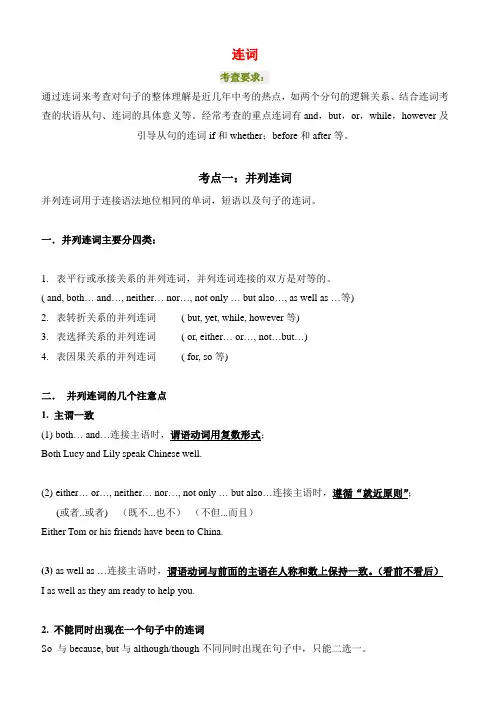
连词考查要求:通过连词来考查对句子的整体理解是近几年中考的热点,如两个分句的逻辑关系、结合连词考查的状语从句、连词的具体意义等。
经常考查的重点连词有and,but,or,while,however及引导从句的连词if和whether;before和after等。
考点一:并列连词并列连词用于连接语法地位相同的单词,短语以及句子的连词。
一.并列连词主要分四类:1.表平行或承接关系的并列连词,并列连词连接的双方是对等的。
( and, both… and…, neither… nor…, not only … but also…, as well as …等)2.表转折关系的并列连词( but, yet, while, however等)3.表选择关系的并列连词( or, either… or…, not…but…)4.表因果关系的并列连词( for, so等)二.并列连词的几个注意点1. 主谓一致(1) both… and…连接主语时,谓语动词用复数形式;Both Lucy and Lily speak Chinese well.(2)either… or…, neither… nor…, not only … but also…连接主语时,遵循“就近原则”;(或者..或者) (既不...也不)(不但...而且)Either Tom or his friends have been to China.(3)as well as …连接主语时,谓语动词与前面的主语在人称和数上保持一致。
(看前不看后)I as well as they am ready to help you.2. 不能同时出现在一个句子中的连词So 与because, but与although/though不同同时出现在句子中,只能二选一。
3. and 与or区别(1) and 用与肯定句,or 用与否定或疑问句(2) 否定句中,连接的两部分都有否定时,应用and.Jim has no sisters and no brothers.(3) 否定句中,without 后面的并列用and连接;肯定句中,without 后面的并列用or 连接Man can’t live without water and air. = Man will die without water or air.考点二:从属连词用来引导从句的连词。
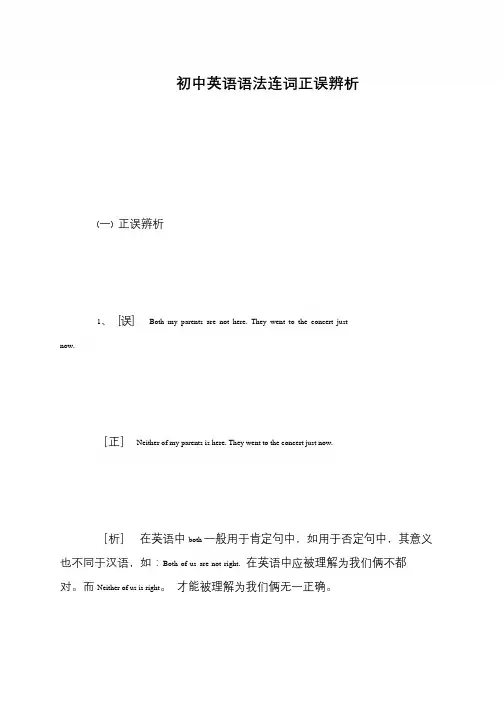
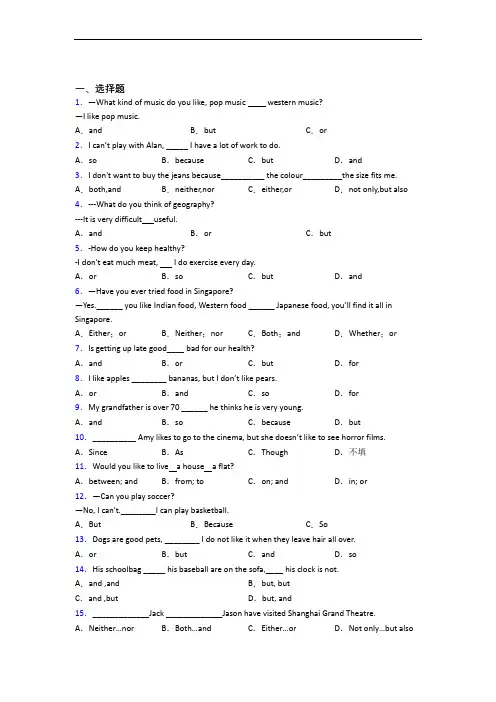
一、选择题1.—What kind of music do you like, pop music western music?—I like pop music.A.and B.but C.or2.I can’t play with Alan, _____ I have a lot of work to do.A.so B.because C.but D.and3.I don't want to buy the jeans because__________ the colour_________the size fits me. A.both,and B.neither,nor C.either,or D.not only,but also 4.---What do you think of geography?---It is very difficult useful.A.and B.or C.but5.-How do you keep healthy?-I don't eat much meat, I do exercise every day.A.or B.so C.but D.and 6.—Have you ever tried food in Singapore?—Yes.______ you like Indian food, Western food ______ Japanese food, you’ll find it all in Singapore.A.Either;or B.Neither;nor C.Both;and D.Whether;or 7.Is getting up late good____ bad for our health?A.and B.or C.but D.for8.I like apples ________ bananas, but I don’t like pears.A.or B.and C.so D.for9.My grandfather is over 70 ______ he thinks he is very young.A.and B.so C.because D.but10.__________ Amy likes to go to the cinema, but she doesn’t like to see horror films. A.Since B.As C.Though D.不填11.Would you like to live a house a flat?A.between; and B.from; to C.on; and D.in; or 12.—Can you play soccer?—No, I can't.________I can play basketball.A.But B.Because C.So13.Dogs are good pets, ________ I do not like it when they leave hair all over.A.or B.but C.and D.so14.His schoolbag _____ his baseball are on the sofa,____ his clock is not.A.and ,and B.but, butC.and ,but D.but, and15._____________Jack _____________Jason have visited Shanghai Grand Theatre. A.Neither…nor B.Both…and C.Either…or D.Not only…but also16.The girl is good at________ singing________ dancing, so she was chosen to perform at the Spring Festival Gala.A.not only; but also B.either; orC.neither; nor D.between; and17.–Would you like to go to the concert with me? –I’d love to, ______ I’m afraid I have no time. A.so B.or C.and D.but18.— What kinds of fruit do you like eating?—Apples as well as oranges.A.and B.but C.or19.—Can Dave paint?—Yes, he can, ________ he can’t paint very well.A.and B.or C.but D.though20.Get up early, John. you will be late for the class.A.And B.But C.So D.Or 21.Because Jim sits ________ me, ________I can’t see the blackboard well.A.in front of; so B.in front of; / C.in the front of; so D.in the front of; / 22.He speaks English French. He speaks Chinese.A.either; or B.not only; but alsoC.both; and D.neither; nor【参考答案】***试卷处理标记,请不要删除一、选择题1.C解析:C【解析】【详解】句意:——你喜欢哪种音乐,流行音乐还是西方音乐?——我喜欢流行音乐。
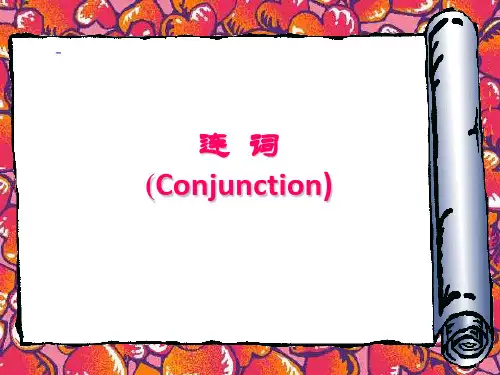
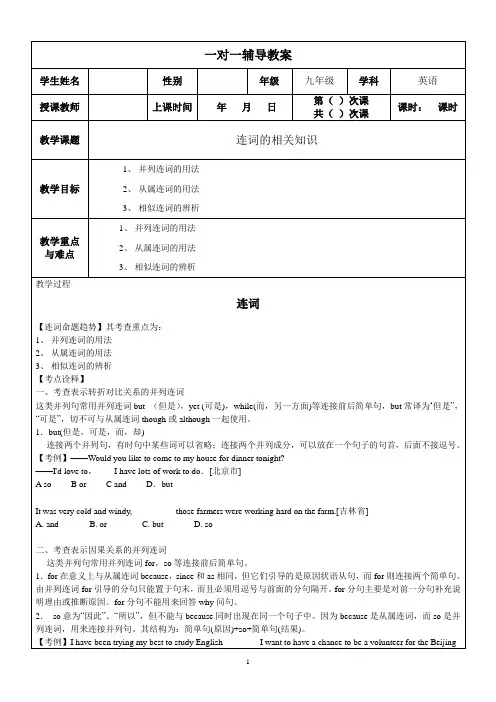
Olympics. [太原市]A, until B. because C. thoughRicky caught a bad cold yesterday, ___________ he had to stay at home. [南京]A. becauseB. butC. orD. so三、考查表示选择关系的并列连词这类并列句常用并列连词or (或者,否则),either..or...(或是……或是;不是……就是)等连接前后简单句。
or连接并列成分时,意为“或者,还是”;用于否定句中,意为“也不”,这时不宜用and;还有“否则,要不然”之意,相当于otherwise。
【考例】Tom ,keep away from the fire,__ you will get burnt. [河南省]A. andB. soC. orD. but四、考查表示并列关系的并列连词【考例】Study hard, ________ you'll pass the exam. [长沙市]A. orB. andC. but六、考查从属连词1、对连接同等的词、词组或分句的and, but, or, for, neither…nor…, either…or…, both…and…, not only…but also…等并列连词的考查。
2、对引导名词性从句或状语从句的when、if、that、because、until、although等从属连词基本用法的考查。
3、几组容易混淆的连词或词组。
We have been good friends ________we joined the same ping-pong team. [陕西省]A. afterB. beforeC. sinceD. untilNone of the shoes in the shop fit me well. They are ______________too big______________ too small. [昆明市]A. both; andB. either; orC. neither; norD. not only; but alsoPlease take the medicine three times a day, _______ it won’t work well.(浙江)A. andB. butC. orD. soHurry up, Jack. We have to get to the station before 11:45 _____ we can catch the 12:00 train. (南通)A. since B. after C. as soon as D. so that—I hear a new film is on these days. Shall we go to the cinema together, Lucy and Lily?—_____Lily_____ I will go with you because one of us must be at home to help our father in the garden. ( 宁波)A. Either, norB. Either, orC. Neither, norD. Both, and【语法回顾】连词4. 连词的功能用来连接词,短语,从句或句子的词叫连词。
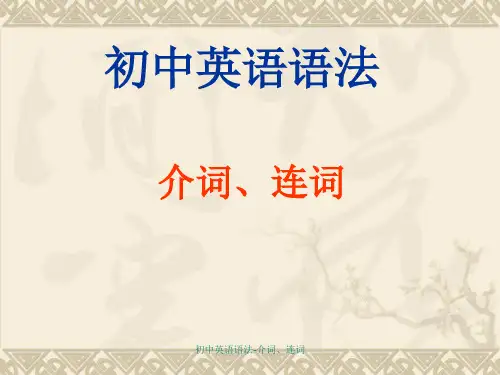

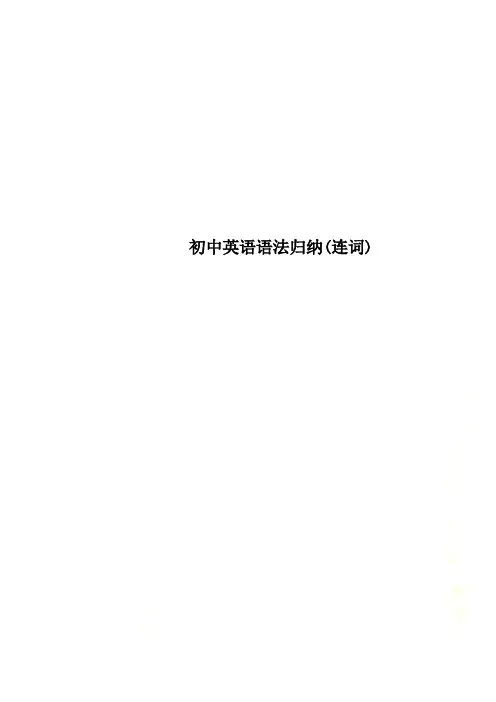
初中英语语法归纳(连词)初中英语语法归纳:连词初中英语学习最难的是语法,因为英语的语法跟汉语的语法有很大的不同。
初中英语连词有很多种。
下面为大家讲解一下初中英语连词的用法。
连词是一种虚词,它不能独立担任句子成分而只起连接词与词,短语与短语以及句与句的作用。
连词主要可分为两类:并列连词和从属连词。
第一类表示并列关系的连词并列连词:并列连词用来连接平行的词、词组和分句。
1)and 和判断改错:(错) They sat down and talk about something.(错) They started to dance and sang.(错) I saw two men sitting behind and whisper there.(对) They sat down and talked about something.(对) They started to dance and sing.(对)I saw two men sitting behind and whispering there.bread and butter a knife and forkThe mother and teacher is very strict with her son.No teacher and no student is allowed to smoke in class.3. and连接的是两个相同意思的词,表示“渐渐”,或加强语气Read it again and again2)both …and两者都She plays (both) the piano and the guitar.3) neither…nor 意思为"既不……也不……"谓语动词采用就近原则,与nor后的词保持一致。
Neither you nor he is to blame.4)not only…but (also)不但······而且······She plays not only the piano, but (also) the guitar.注意:not only… but also 关联两个分句时,一个分句因有否定词not 而必须倒装。
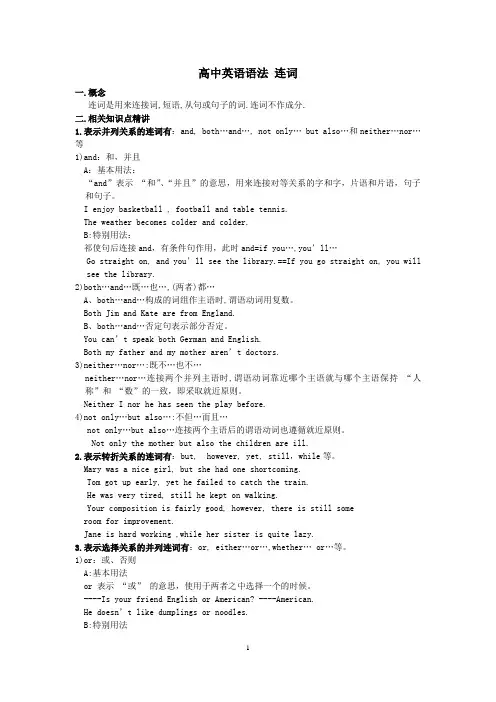
高中英语语法连词一.概念连词是用来连接词,短语,从句或句子的词.连词不作成分.二.相关知识点精讲1.表示并列关系的连词有:and, both…and…,not only… but also…和neither…nor…等1)and:和,并且A:基本用法:“and”表示“和”、“并且”的意思,用来连接对等关系的字和字,片语和片语,句子和句子。
I enjoy basketball , football and table tennis.The weather becomes colder and colder.B:特别用法:祁使句后连接and,有条件句作用,此时and=if you…,you’ll…Go straight on, and you’ll see the library.==If you go straight on, you will see the library.2)both…and…既…也…,(两者)都…A、both…and…构成的词组作主语时,谓语动词用复数。
Both Jim and Kate are from England.B、both…and…否定句表示部分否定。
You can’t speak both German and English.Both my father and my mother aren’t doctors.3)neither…nor…:既不…也不…neither…nor…连接两个并列主语时,谓语动词靠近哪个主语就与哪个主语保持“人称”和“数”的一致,即采取就近原则。
Neither I nor he has seen the play before.4)not only…but also…:不但…而且…no t only…but also…连接两个主语后的谓语动词也遵循就近原则。
Not only the mother but also the children are ill.2.表示转折关系的连词有:but, however, yet, still,while等。
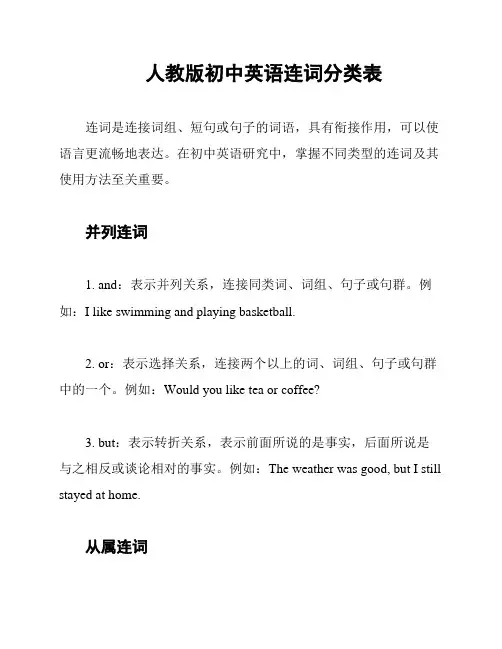
人教版初中英语连词分类表连词是连接词组、短句或句子的词语,具有衔接作用,可以使语言更流畅地表达。
在初中英语研究中,掌握不同类型的连词及其使用方法至关重要。
并列连词1. and:表示并列关系,连接同类词、词组、句子或句群。
例如:I like swimming and playing basketball.2. or:表示选择关系,连接两个以上的词、词组、句子或句群中的一个。
例如:Would you like tea or coffee?3. but:表示转折关系,表示前面所说的是事实,后面所说是与之相反或谈论相对的事实。
例如:The weather was good, but I still stayed at home.从属连词1. because:表示原因,引导原因状语从句。
例如:I couldn't go to the concert because I was sick.2. if:表示条件,引导条件状语从句。
例如:If it rains tomorrow, we will stay at home.3. when:表示时间,引导时间状语从句。
例如:When I was a child, I liked playing with my friends.过渡性连词1. however:表示转折,与but的意义类似,但用于句中,连接两个独立的句子。
例如:He is very talented. However, he is not willing to work hard.2. therefore:表示因此,引导结果状语从句。
例如:He is very hardworking. Therefore, he passed the exam.以上是人教版初中英语常见连词的分类和使用方法,希望对您的英语学习有帮助。
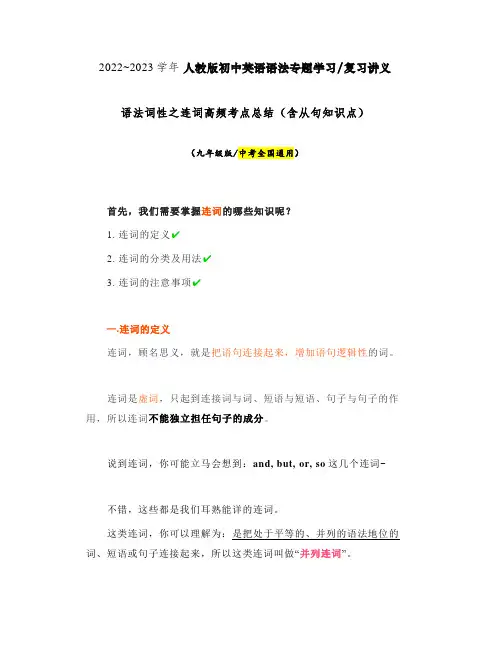
2022~2023学年人教版初中英语语法专题学习/复习讲义语法词性之连词高频考点总结(含从句知识点)(九年级版/中考全国通用)首先,我们需要掌握连词的哪些知识呢?1. 连词的定义✔2. 连词的分类及用法✔3. 连词的注意事项✔一.连词的定义连词,顾名思义,就是把语句连接起来,增加语句逻辑性的词。
连词是虚词,只起到连接词与词、短语与短语、句子与句子的作用,所以连词不能独立担任句子的成分。
说到连词,你可能立马会想到:and, but, or, so这几个连词~不错,这些都是我们耳熟能详的连词。
这类连词,你可以理解为:是把处于平等的、并列的语法地位的词、短语或句子连接起来,所以这类连词叫做“并列连词”。
英文中还有一类连词,专门连接主句和从句的连词,叫作“从属连词”。
主句 + 从属连词 + 从句因为从句可以理解为:是主句的某个句子成分,是主句的一部分,所以这一大类连词叫作从属连词。
考虑到,中文中没有英文中那样的从句,所以我们需要单独理解一下这类连词。
二.连词的分类那我们先来看下并列连词。
1. 并列连词并列连词,起并列、连接作用的,并且它连接着的是有着同等语法地位的单词、词组或者句子。
但是需要注意:“同等地位”,在逻辑上又可以细分下去。
1.1 表并列关系•并列连词中表“并列关系”的:My daughter is smart and cute.我女儿聪明又可爱。
She can dance and play the piano.她既会跳舞又会弹钢琴。
Both my daughter and my son like reading books.我女儿和儿子都喜欢读书。
My daughter not only smart but also cute.我女儿不仅聪明而且敲可爱。
1.2 表否定关系•并列连词可以表“否定关系”。
Neither my daughter nor my son likes apples.我女儿和儿子都不喜欢苹果 。
初中英语语法大全之连接词辨析连接词辨析(1) because、as、since、for的用法:because(因为)表示原因的语气最强,常表示必然的因果关系,从句一般放在主句后面;另外,回答why的问句只能用because. as(因为)表示一般的因果关系,语气比because弱,说明比较明显的原因,它引导的从句可以放在句首也可以放在句尾。
since(既然)表示对方已经知道、无需加以说明的原因或事实。
for(因为)是并列连词,语气较弱,用来补充说明理由或提供一种解释。
如:He is not at school today because he is seriously ill.(他今天没有上学因为他病得厉害)/ As all of you have got here, now, lets go to the zoo.(既然大伙儿都到了我们就去动物园吧)/ I will ask Lin Tao to go with me since you are very busy.(既然你很忙我就叫林涛和我一起去吧)/ We must be off now for the match starts at 7:00.(我们得走了因为比赛在七点开始)(2)if、whether的区别:表示是否时,if和whether同义,引导宾语从句,另外,whether还可以引导主语从句、表语从句(以及同位语从句)等名词性从句或者让步状语从句;而if还可以表示如果,引导条件状语从句,(主句与从句遵循主将从现的原则)。
如:I dont know if/whether he will arrive on time.(我不知道他是不是会按时到达)/ I will ring you up if he arrives on time.(如果他按时到达我会给你打电话的)[注意]下列情况只能用whether不能用if:①引导主语从句,②引导表语从句,③引导从句作介词宾语,④引导不定式短语,⑤引导让步状语从句,⑥在动词discuss之后,⑦在wonder / not sure之后,⑧在if 与whether含义易混时。
连词一、并列连词:(一)连词的概念:连词是一种虚词,不能担任一个句子成分。
连词在句中主要起连接词与词、短语与短语及句子和句子的作用。
它主要是包括并列连词和从属连词。
She’ll be back either this week or next week.她将在这周或下周回来。
I went and she went also. 我去了,她也去了。
(三)并列连词的用法:1、并列连词and和or:①and和or 是用得最多的并列连词,可以连接:a. 两个并列的动词:We were singing and dancing all evening. 整个晚上我们都在唱歌跳舞。
b. 名词、形容词等:This apple is big and red. Would you like fish or beef?c. 两个并列的分句(句子):I said it and I meant it. 我说话算数。
②and 可连接两个分句,表示递进关系。
Give him an inch and he will take a mile. 他会得寸进尺。
③or可连接分句,表示“否则”:Don’t drive so fast or you’ll have an accident.别开这么快,不然你会出车祸。
2、表示意思转折的连词:but, yet:①but和yet的用法:The weather will be sunny but cold. 天气会晴朗但很冷。
It is strange, yet true. 这很奇怪,却是真的。
②however, still 等为副词,但可起连接作用,表示意思的转折---“但是”或“然而”。
a. however: His first response was to say no. Later, however, he changed his mind.他的第一反应是不行,但后来他改变了主意。
b. still: It’s raining; still I’d like to go.天在下雨,但我还是要去。
中考指导:初中英语语法之连词连词是连接字、短语、从句与句子的词,是虚词,因此它不能独立担任句子成分。
连词主要分为两大类:并列连词和从属连词。
并列连词用来连接并列关系的词、词组或分句。
下面就来跟小编一起学习学习吧。
连词包括:and,or,but,so,for,both…and,either…or,neither…nor,not only…but also。
从属连词用来引导从句,它包括: that, when, till, until, after,before, since,because,if,whether,though,although,so…that,so that,in order that,as soon as并列连词用来连接具有并列关系的词,短语或句子。
常见的并列连词有:(1)表并列关系的and, both…and, not only…but also, neither…nor等。
(2)表选择关系的or, either…or等。
(3)表转折关系的but, while等。
(4)表因果关系的for, so等。
1并列连词1 and:和,并且I like basketball, football and table-tennis.我喜欢篮球、足球和乒乓球。
1.基本用法and表示“和”、“而且”的意思,用来连接对等关系的字和字,片语与片语,句子与句子。
He got up and put on his hat.他站起来,戴上了帽子。
I went to the Summer Palace and he went to Bei Hai Park.我去颐和园,他去北海公园。
注意单词或词组如果是三个以上连接,一般在最后的单词或词组前加and。
另外“and”在译成中文时不一定要翻译出“和”来。
2.特别用法:and在祈使句中的作用句型:祈使句,and…=If you…,you'll…Use your head,and you'll find a way.动动脑筋,你就会想出办法来。
初中英语语法大全之连词知识点总结连词是一种连接词与词,短语与短语以及句与句的虚词,它不能独立担任句子成分而只起连接作用。
连词主要可分为两类:并列连词和从属连词。
一、并列连词用来连接平行的词、词组和分句。
并列连词连接的双方是对等的。
常有的并列连词有and, bothand(两者都), neithernor(既不也不),not onlybut also(不但而且), as well as等。
但如果连接的两部分意义不趋向一致,意义有转折的并列连词有:but(但是), however(然而), while (而),only (只不过)。
还有表示选择关系的并列连词,如:or, eitheror(或者或者), 再有的是连接双方,互为因果,或表示前因后果的连词有:for(因为), so(所以), therefore (因此)等。
例句:She plays not only the piano, but (also) the guitar.二、从属连词,在初中范围内常常考查引导状语从句、宾语从句的从属连词。
其中有时间状语从句,常用的连接词有:when,while, as, since, before, after, once, as soon as, until, till连接条件状语的连词有:if, unless, as long as等,而原因状语的连接词有because, since, as, now that (既然)。
目的、结果、方式、比较、地点等状语从句的连接词有:so that, sothat, suchthat, asas, than, where 它们在句子与文章中几乎无处不见。
用来连接宾语从句,如:that, if, whether。
例句如下:Tom will call me as soon as he gets to Shanghai.The meeting didn’t start until everyone was there.I want to know if she is going to see a film.常见考法对于连词,主要以单项选择或完形填空的形式从意义和功能(重点是意义)角度考查学生灵活运用连词的能力。
连词一.概念连词是用来连接词,短语,从句或句子的词.连词在句子不能独立充当句子的成分。
.二.知识点精讲(按语法含义分类)a.并列连词的用法:1.表示并列关系,有:and, both…and…,not only… but also…和neither…nor…等1)and:和,并且A:基本用法:“and”表示“和”、“并且”的意思,用来连接对等关系的字和字,片语和片语,句子和句子。
I enjoy basketball , football and table tennis.The weather becomes colder and colder.B:特别用法:祁使句后连接and,有条件句作用,此时and=if you…,you’ll…Go straight on, and you’ll see the library.==If you go straight on, you will see the library.2)both…and…既…也…,(两者)都…A、both…and…构成的词组作主语时,谓语动词用复数。
Both Jim and Kate are from England.B、both…and…否定句表示部分否定。
You can’t speak both German and English.Both my father and my mother aren’t doctors.3)neither…nor…:既不…也不…neither…nor…连接两个并列主语时,谓语动词靠近哪个主语就与哪个主语保持“人称”和“数”的一致,即采取就近原则。
Neither I nor he has seen the play before.4)not on ly…but also…:不但…而且…not only…but also…连接两个主语后的谓语动词也遵循就近原则。
Not only the mother but also the children are ill.2.表示转折关系,有:but, however, yet, still,while等。
Mary was a nice girl, but she had one shortcoming.Tom got up early, yet he failed to catch the train.He was very tired, still he kept on walking.Your composition is fairly good, however, there is still someroom for improvement.Jane is hard working ,while her sister is quite lazy.3.表示选择关系,有:or, either…or…,whether… or…等。
1)or:或、否则A:基本用法or 表示“或” 的意思,使用于两者之中选择一个的时候。
----Is your friend English or American? ----American.He doesn’t like dumplings or noodles.B:特别用法祁使句后连接or ,表“如果…,否则…”,有转折的意思,此时or =if you don’t …,you’ll …Hurry up, or you’ll be late.=If you don’t hurry up, you’ll be late.2)either…or…:或者…或者…; 不是…就是…;要么…要么…A.either…or…连接两个并列主语时,谓语动词靠近哪个主语就与哪个主语保持“人称”和“数”的一致,即就近原则。
Either you or I am right.Does either she or they like English?B.由either…or…引导的否定句是完全否定。
She isn’t either a student or a teacher.3)whether…or…不管…还是…She is always cheerful, whether at home or at school.4.表示因果关系,有:for(因为),so(所以)。
He is not at school today, for he has a bad cold.It was late, so I went home.b.从属连词的用法:1.引导时间状语从句,有:before, after, when, while, as, till, until, since, as soon as等。
After they had planted their crops, they took a rest.We have learned six lessons since he began to teach us.As soon as he gets to Beijing, he’ll call me.1) when, while, as 都表示“当……时”,when从句谓语动词既可以是瞬间动词也可以是延续性动词,可用于主从句动作同时发生或从句动作先于主句动作发生。
while从句谓语动词只能是延续性动词,侧重主从句动作同时发生。
as引导一个持续性动作,多用于主从句动作同时发生,强调“一边……一边”。
When I came in, my father was cooking.I came in when/while my father was cooking.He sang as he walked.2)until用法:当主句谓语动词是延续性动词时,主从句都用肯定式,译为“直到……为止”;当主句谓语动词是瞬间动词时,主句用否定式,从句用肯定式,即not…..until, 译为“直到……才”。
Mr. Green waited until his children came back.(格林先生一直等到他的孩子们回来) Mr. Green didn’t go to bed until his children came back. (格林先生直到他的孩子们回来才睡觉)2. 引导条件状语从句,有:if(如果), unless(除非,如果……不)等。
If you don’t go soon, you’ll be late.=Unless you go soon, you’ll be late.3.引导原因状语从句,有 because, as, since等。
because“因为”语气最强,回答why提问时只能用because,其引导的从句可放在句首或句末;as“由于”、since“既然”语气不如because强,引导的从句常置于句首;for是并列连词,语气最弱,对前面分句加以解释或补充说明,其引导的分句常置于句末且用逗号隔开。
He didn’t go to school because he was ill.As it was raining, we went there by bus.Since everybody is here, let’s begin.It must have rained last night, for the ground is wet.注意: because与 so不能同时使用。
8.引导让步状语从句,有:although/though(虽然,尽管), even though/if (即使) Although/ Though it is a very young country, it is very rich.Even if/ though you were here yesterday, you couldn’t help him.注意:although/though 引导的从句不能与but连用,但可与yet, still连用。
9.引导目的状语从句,有so that和in order that(以便,为了)等。
The teacher spoke loudly so that /in order that we could hear him clearly.10.引导结果状语从句,有:so that(结果是)和so/such…that…(如此…以至于)等。
It was very cold, so that the water in the bowl froze.He got there so early that he got a good seat.It is such a heavy box that nobody can move it.11.引导比较状语从句,有:as…as…(与……一样),not as/so… as…(不及,赶不上),和than(比)等。
I know you better than she does.He works as carefully as she.I can’t run as/so fast as you.12.引导名词性从句,有:that和 if/whether(是否)等。
We know that the earth goes around the sun.(宾语从句)I wonder if he has received my e-mail. (宾语从句)注意:在时间状语从句和条件状语从句中,如果主句是将来时,从句要用一般现在时。
I’ll go on with the work when I come back tomorrow.中考模拟题:类型一:考察并列连词:1、I don’t like reading watching TV. What about you? “I don’t like reading答案:1--6:DABBAA类型二:考察从属连词:、 the teacher came into the classroom, many students were talking to each other.答案:1--7:ABCDDCA1. —Oh, I failed again—Don’t lose heart. One more effort, ________ you will succeed.A. so thatB. thereforeC. howeverD. and2. ________ a difficult situation, so you should send him a message and give him some advice. A. As he is in B. He is inC. Being inD. He being in3. She said she would work it out herself, ________ ask me for hel p. A. and not to B. but not C. and prefer notD. rather than4. ________ enough time, but I couldn’t do it better.A. I was givenB. GivenC. To be givenD. Though I was given5. —How can I wake up so early?—Set the alarm at 5 o’clock, ________ you’ll make it.A. butB. orC. andD. so6. For a person with reading habits, a printed page contains not on ly words ________ ideas, thoughts and feelings.A. yetB. andC. orD. but7. Information technology is taught in most schools, ________ we haveentered the information society.A. soB. whileC. stillD. for8. English is understood all over the world ________ Turkey is spoke n by only a few people outside Turkey itself.A. whileB. whenC. ifD. as9. I was on the point of going to bed ________ Mr. Zhang rang. A. as B. when C. whileD. and10. I asked him whether he had done all the work himself ________ whether he had had any assistance.A. andB. butC. norD. or11. In some countries, ________ are called “public schools”are not owned by the public. A. which B. asC. whatD. that12. ________ happens in the world makes us happy and sad by turns.A. ThatB. WhatC. WhichD. Whether13. I read about this story in some book or other, does it matter ________ it was? A. where B. what C. how D. which14. One of the men present held the view ________ the book said wa s right. A. what that B. what C. that D. that what15. ________ I had walked for six hours, I was tired out.A. AfterB. BeforeC. WhenD. As16. Tom make up his mind to get a seat for the football match ___ _____ it means standing in a queue all night.A. as ifB. as thoughC. even ifD. whatever17. The roof fell ________ he had time to dash into the house to save his baby. A. as B. afterC. untilD. before18. Doing your homework is a sure way to improve your test scores, and this is especially true ________ it comes to classroom tests.A. asB. sinceC. whenD. after19. I have been keeping that photo ________ I can see it every day , as it always reminds me of my college days.A. whichB. whereC. whetherD. when20. You may borrow this book --- ________ you promise to give it b ack. A. in case B. so long asC. as ifD. even if21. ________ the man grew older, he lost interest in everything exce pt gardening. A. With B. SinceC. WhileD. As22. ________ you understand this rule, you’ll have no further difficulty.A. OnceB. UnlessC. AsD. Until23. I had no sooner got back to the kitchen ________ the door-bell rang loud enough to wake the dead.A. whenB. thanC. asD. while24. I criticized him, you know, not ________ I hate him but _______ _ I love him.A. because; becauseB. because; forC. f or; becauseD. for; for25. ________ he studies hard, he will never pass the examination.A. IfB. UnlessC. Even ifD. Even though26. She worked hard ________ everything would be ready by the time he came back. A. since B. so thatC. as ifD. unless27. He waited ________ the volcano became quiet and he was able to return two days later. A. when B. beforeC. asD. until28. —May I go and play football with Dick this afternoon, Dad? —No, you can’t go out ________ your work is being done.A. beforeB. untilC. asD. after29. A warning news report from Qatar announces that a group of Isla m will continue to kill Americans wherever they are ________ they le ave the Arab world forever.A. even thoughB. in caseC. wheneverD. until30. I was so familiar with her that I recognized her voice ________I picked up the phone. A. the moment B. afterC. beforeD. while1. D. 考查“祈使句/名词+and+陈述句”句型。